1.88 miles 1h 9m
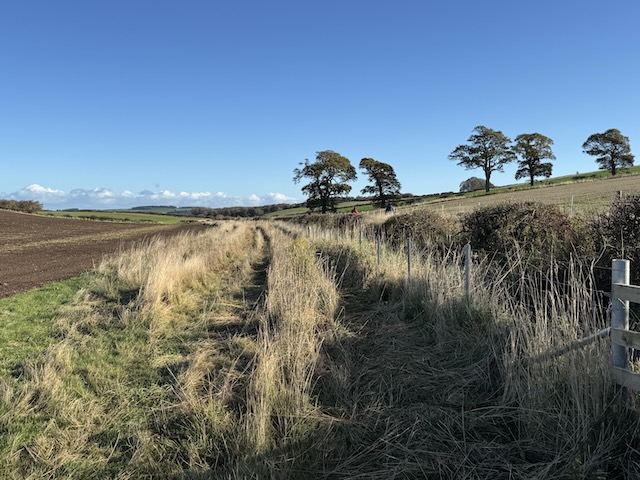
I’ve heard them lilting at our ewe-milking,
Lasses a-lilting before the dawn of day;
But now they are moaning on ilka green loaning-
The Flowers of the Forest are a’ wede away.
A short walk but interesting nonetheless. We had lovely weather and firm ground underfoot. I had read that the walk was “about an hour” but also “about half an hour”. We tarried at the monument, read all the information boards, stopped to listen to “Flowers of the Forest” on my phone, visited the “Flodden Visitor Centre”, stopped to stare at the drinking fountains and had a look at St Paul’s Church. And that was just over an hour.
A monument stands on a small rise overlooking the site of the largest battle between Scotland and England, the Battle of Flodden Field. The granite cross was erected in 1910 as a memorial to those who died.
The trail was well marked, with information boards placed to explain the flow of the battle at particular places.
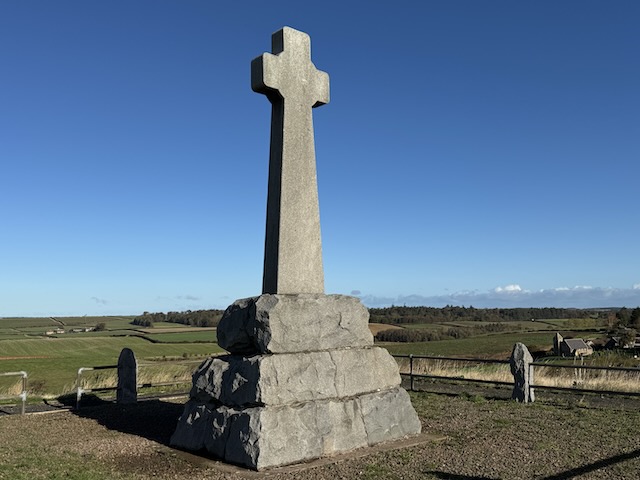
In early September 1513 an invading Scottish Army crossed the Tweed while the bulk of England’s armies were fighting France on the continent. The Scots easily took several northern castles. Henry VIII sent the Earl of Surrey to face them. He had few men and was expected to muster more on his way north. Surrey was an old man but his seventy years had not been spent in foppish extravagance. Wikipedia describes him as a henchman. His force met the invaders on the 9th September 1513.
The Scots were camped on Flodden Hill. They outnumbered the English two to one, had the higher ground, larger guns and longer pikes. The battle initially looked to be going Scotland’s way but in three hours the tide of battle had turned and it was all over. The English had 1,700 men dead. The Sottish losses, though, were catastrophic. The 10,000 Scottish dead included King James IV, an archbishop (the king’s son), two bishops, 11 earls, 15 lords and 300 knights: a whole generation of Scottish nobility.
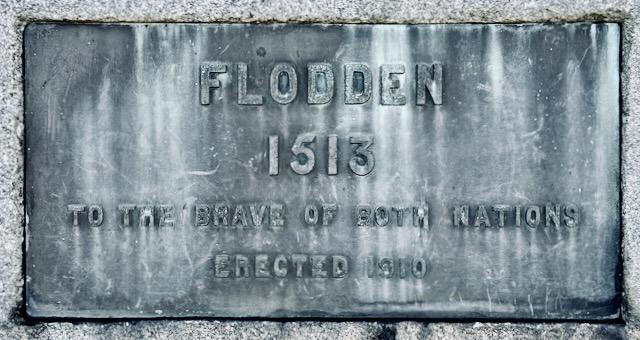
The words for the lament, “Flowers of the Forest”, were written decades later. The original words are lost. Those we have are a re-working Jean Elliot from 1756.
Now listen to the pipes.
Despite what the lyrics would have us believe, it was not by guile that the English won the day, but the inexperience of King James in battle.
Anyway…..
As I said, a short walk.
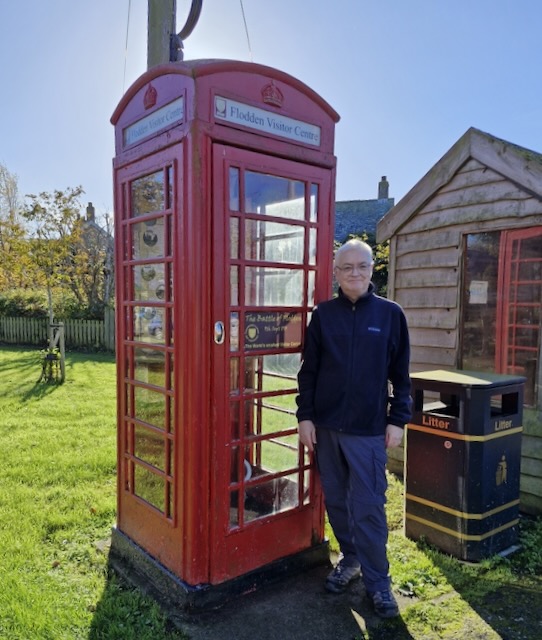
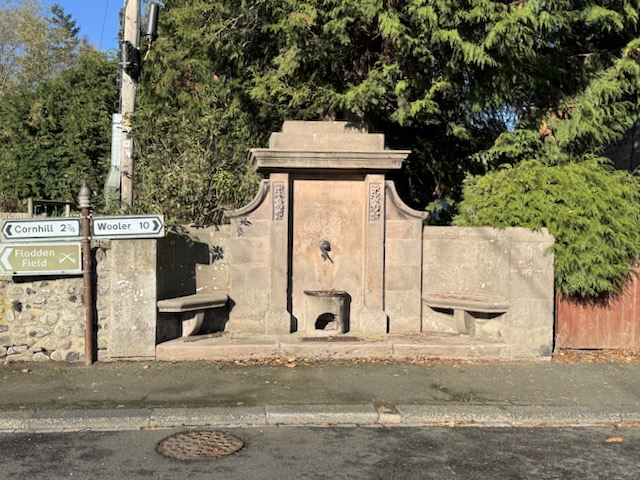
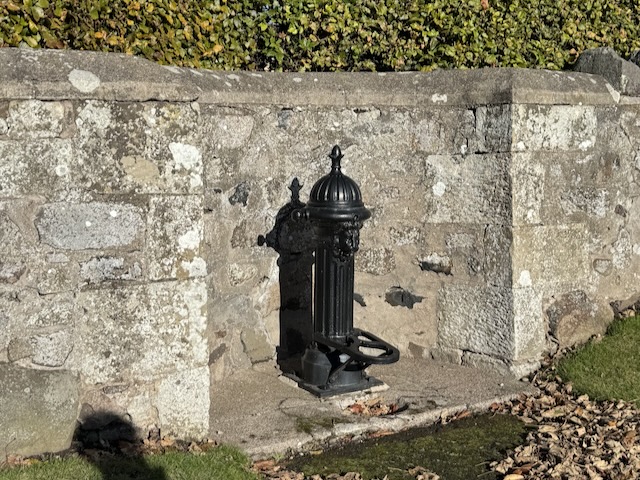
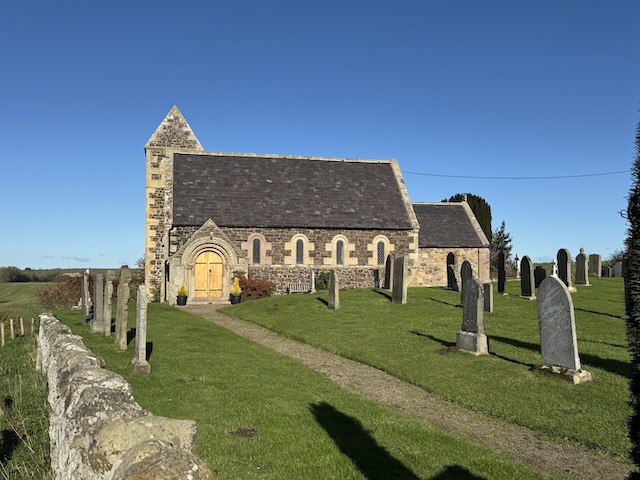
The Visitor Centre claims to be the world’s smallest. It is in an old Phone Box, bought for the purpose for £1. And as one review mentioned, no gift shop.
There were two defunct drinking fountains in the village. I now know that one is a “pant and trough”. It was dedicated “To the memory of Watson Askew Robertson of Pallinsburn July 1910“. The other was shaped like a fire hydrant but had what appeared to be a shoe scraper attached.
We finished our walk with a look around the little Church of St Paul just across from the car park. The present building has an old look but is a major renovation from Victorian times. Only minor elements of the original 12th century building surviving. That earlier church is said to have been used after the battle, first as an infirmary and then as a mortuary.
I’ve heard them lilting at our ewe-milking,
Lasses a-lilting before the dawn of day;
But now they are moaning on ilka green loaning-
The Flowers of the Forest are a’ wede away.
At bughts, in the morning, nae blythe lads are scorning,
The lasses are lonely, and dowie, and wae;
Nae daffin’, nae gabbin’, but sighing and sabbing,
Ilk ane lifts her leglin and hies her away.
In har’st, at the shearing, nae youths now are jeering,
Bandsters are lyart, and runkled, and gray;
At fair or at preaching, nae wooing nae fleeching-
The Flooers of the Forest are a’ wede away.
At e’en, in the gloaming, nae younkers are roaming
‘Bout stacks wi’ the lasses at bogle to play;
But ilk ane sits drearie, lamenting her dearie-
The Flooers of the Forest are weded away.
Dool and wae for the order sent our lads to the Border!
The English, for ance, by guile wan the day;
The Flooers of the Forest, that foctt aye the foremost,
The prime of our land, lie cauld in the clay.
We’ll hear nae mair lilting at our ewe-milking;
Women and bairns are heartless and wae;
Sighing and moaning on ilka green loaning-
The Flooers of the Forest are a’ wede away.
Jean Elliot

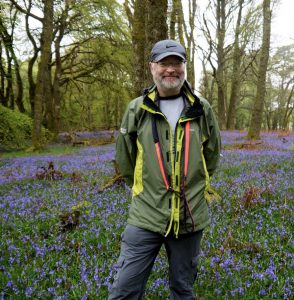
Hullo Drow ‘n’ Smir, you seem to be in mid-Nithsdale somewhere. I recently worked out a Nithsdale Way Southerness to Wanlockhead. Better than the Annandale one. Interested in exchanging notes?
Sure. I have often given that a thought. I started at the source of the Nith but gave up after a couple of outings.